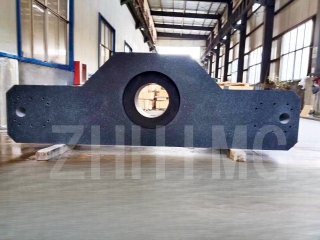Granite bases are essential components of Coordinate Measuring Machines (CMMs). They provide a stable foundation for the machines and ensure accurate measurements. However, different CMMs have varying specifications, which means that choosing the correct size of the granite base can be challenging. In this article, we will discuss how to choose the size of the granite base to adapt to different specifications of the CMM.
1. Consider the size of the CMM
The size of the granite base should match the size of the CMM. For instance, if the CMM has a measuring range of 1200mm x 1500mm, you will need a granite base that is at least 1500mm x 1800mm. The base should be large enough to accommodate the CMM without any overhang or interference with other parts of the machine.
2. Calculate the weight of the CMM
The weight of the CMM is an essential factor to consider when choosing the size of the granite base. The base should be able to support the weight of the machine without any deformation. To determine the weight of the CMM, you may need to consult the manufacturer's specifications. Once you have the weight, you can choose a granite base that can support the weight without any issues.
3. Consider the vibration resistance
CMMs are susceptible to vibrations, which can affect their accuracy. To minimize vibrations, the granite base should have excellent vibration resistance. When choosing the size of the granite base, consider its thickness and density. A thicker granite base will have better vibration resistance compared to a thinner one.
4. Check the flatness
Granite bases are known for their excellent flatness. The flatness of the base is essential since it affects the accuracy of the CMM. The deviation in flatness should be less than 0.002mm per meter. When choosing the size of the granite base, ensure that it has excellent flatness and meets the required specifications.
5. Consider the environment
The environment in which the CMM will be used is also an essential factor to consider when choosing the size of the granite base. If the environment is prone to changes in temperature or humidity, you may need a larger granite base. This is because granite has a low thermal expansion coefficient and is less susceptible to changes in temperature and humidity. A larger granite base will provide better stability and minimize any effects of the environment on the CMM's accuracy.
In conclusion, choosing the size of the granite base for your CMM is essential to ensure accurate measurements. Consider the size of the CMM, weight, vibration resistance, flatness, and environment when making your decision. With these factors in mind, you should be able to choose a granite base that is appropriate for your CMM and meets all necessary specifications.
Post time: Apr-01-2024

